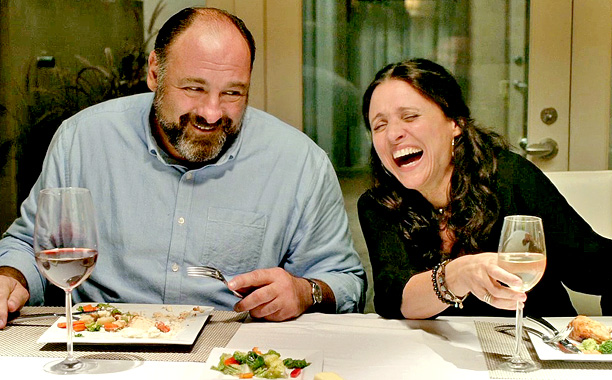Reviews
Movie review: “Enough Said”

Enough Said
dir. Nicole Holofcener
Release Date: Sep 27, 13
- 1
- 2
- 3
- 4
- 5
- 6
- 7
- 8
- 9
- 10
Enough Said is just a nice movie. Nice people living in nicely appointed Southern California homes have nice conversations and occasionally encounter conflict but return to their largely nice lives with a lesson. A lot of the dialogue surrounding writer-director Nicole Holofcener’s work as a filmmaker surrounds whether it’s unfair for many to write her work off because of its primary focus on “first world problems.” It is, thoroughly so, but there’s a kernel of truth there. In most of her films, and especially in Enough Said, the stakes are so low that the film relies on pleasantries to move it along. However, it does get at least a little farther than you’d think on pleasantries alone.
Working as a traveling massage therapist, Eva (Julia Louis-Dreyfuss, her first live-action film role in 16 years) spends her days dealing with quirkily obnoxious clients and her nights stressing over her daughter’s impending relocation to Sarah Lawrence. Single and avoidant of loneliness, Eva meets Albert (James Gandolfini) by chance at a party and immediately becomes smitten. They date, and Eva relishes her newfound romantic success, especially in counter to her client Marianne (Catherine Keener) and her horror stories about her slobbish, incessantly irritating ex-husband. Fitting the pieces together yet? An entire film predicated on connecting the dots in that sentence ensues.
Despite the hammy premise, which could sustain the entire length of a season for some sitcoms, Louis-Dreyfuss and Gandolfini make for a charming pair. The late actor lends Albert a weariness that’s familiar and endearing even as it also reveals quite a bit of sadness. (Albert has a daughter the same age as Eva’s, who’s also headed away for school on the East Coast.) Albert never falls into cliché as the bumbling type, and rather serves as a quietly wise divorcee who’s done the dance and doesn’t particularly care to risk doing it again. And Louis-Dreyfuss, as his scattered and neurotic foil, is charming and worryingly scattered as she goes along. She’s the most undercut by the trope-heavy screenplay, but still maintains an easy, perfect chemistry with Gandolfini that carries her along when she has to spend 75 percent of the film performing upkeep in the latest rendition of what Roger Ebert would call the “Idiot Plot.” (That is to say, the main story running through Enough Said could readily be resolved in a positive manner by a short conversation between one or more characters.)
Holofcener deserves some of the credit for that chemistry as well. Though not particularly flashy as a filmmaker save for the sort of loving gazes over interior design porn that’d make Nancy Meyers blush, Holofcener has long been able to get good to great performances out of actors. The conversations between Eva and Albert, and between their friends as well, have an easy and natural cadence early on in the film, following along with the relaxed-yet-wary rhythms of a newborn relationship. When the film is left beholden to plot, that quality is played down to disappointing results, and some of the late beats feel a bit too insubstantial to generate the sea changes they do. Enough Said would have come out much better if Holofcener stuck to the most engaging piece of the film, and the one in which she’s clearly most interested: the everyday lives of nice people.